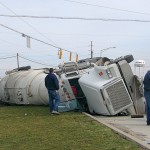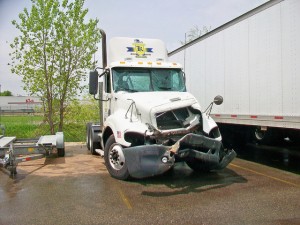What Are Most Common Causes Of Truck Accidents?

If you’ve ever been involved in an accident with a commercial truck, you’re well aware of how truly terrifying it can be. Often, commercial trucks are many times the size of passenger vehicles, making a collision with them particularly dangerous. They may even be hauling huge loads of harmful products, which can create an even more hazardous situation.
On top of all of this, a trucking accident is often more difficult to deal with than a traditional auto accident when trying to prove liability. There are usually more people involved since you’ll need to deal with the trucking company, and non-truck drivers are frequently in the dark about a commercial truck’s performance capabilities.
Should you decide to seek legal action after being involved in a trucking accident, a little industry insight might help you understand the situation better.
Common Causes of Accidents
Truckers and passenger vehicle drivers alike are responsible for trucking accidents. Most commonly, a regular driver can cause an accident simply because they don’t understand a large truck’s limitations when it comes to braking and visibility. A regular driver may cause an accident by:
- Driving between two trucks
- Driving in the areas behind and beside a truck where drivers have zero visibility, known as the “No Zone”
- Cutting off a truck such that the truck driver has little time to brake to avoid a collision
- Pulling in front of a truck and failing to accelerate quickly
Truck drivers cause their fair share of accidents as well, though the reasons can go beyond simple driving errors. Causes include:
- Fatigue/sleep deprivation
- Improper truck maintenance
- Overloaded trailer
- Inadequate training
- Speeding to compensate for unrealistic delivery times
- Faulty brakes or tires
In order to combat fatigue, it’s not uncommon for truck drivers to take medication of some kind to perk them up, which could have adverse effects of its own.
Dealing with a Trucking Accident

If you were in an accident with a commercial truck and weren’t responsible, you may have to jump through some hoops to pin liability on the driver or company. The first problem arises in the form of many possible parties that can be held responsible for your injuries. It could be the driver, the trucking company, the truck manufacturer, the owner of the truck, or the company who leased or rented the truck to the owner.
It’s not uncommon for all of these parties to battle it out to determine whose insurance should pay for damages. For example, the trucking company might say defective brakes caused the accident, but the manufacturer could claim that the company failed to properly maintain the brakes.
Fortunately, federal law has taken steps to smooth out the process. If a company owns a trucking permit, they must take responsibility for an accident involving a truck depicting the company’s name or placard.
Determining Cause
There are a few ways to prove you aren’t liable for a trucking accident. While police reports and eye witness testimonies are always valuable, you can also turn to the government and certain devices for help.
Federal and state regulations require that all trucks involved in an accident be inspected before being removed from the scene. A certified truck inspector takes a look at the truck to ensure that all of its parts were in working order, and then he or she files a report with the appropriate government agency. You can access that information if you feel like it is important to your case.
Additionally, the trucking industry now uses a device similar to the black box found on planes that records and stores vital data that can be used to determine how an accident occurred. It can tell investigators how fast the truck was going, when the brakes were used, and even how long the truck had been on the road.
When you decide to move forward with a claim after your trucking accident, don’t hesitate to seek professional legal help. Because so many different players can be involved in a case like this, you will undoubtedly need assistance in navigating the sometimes treacherous waters of the trucking industry.
